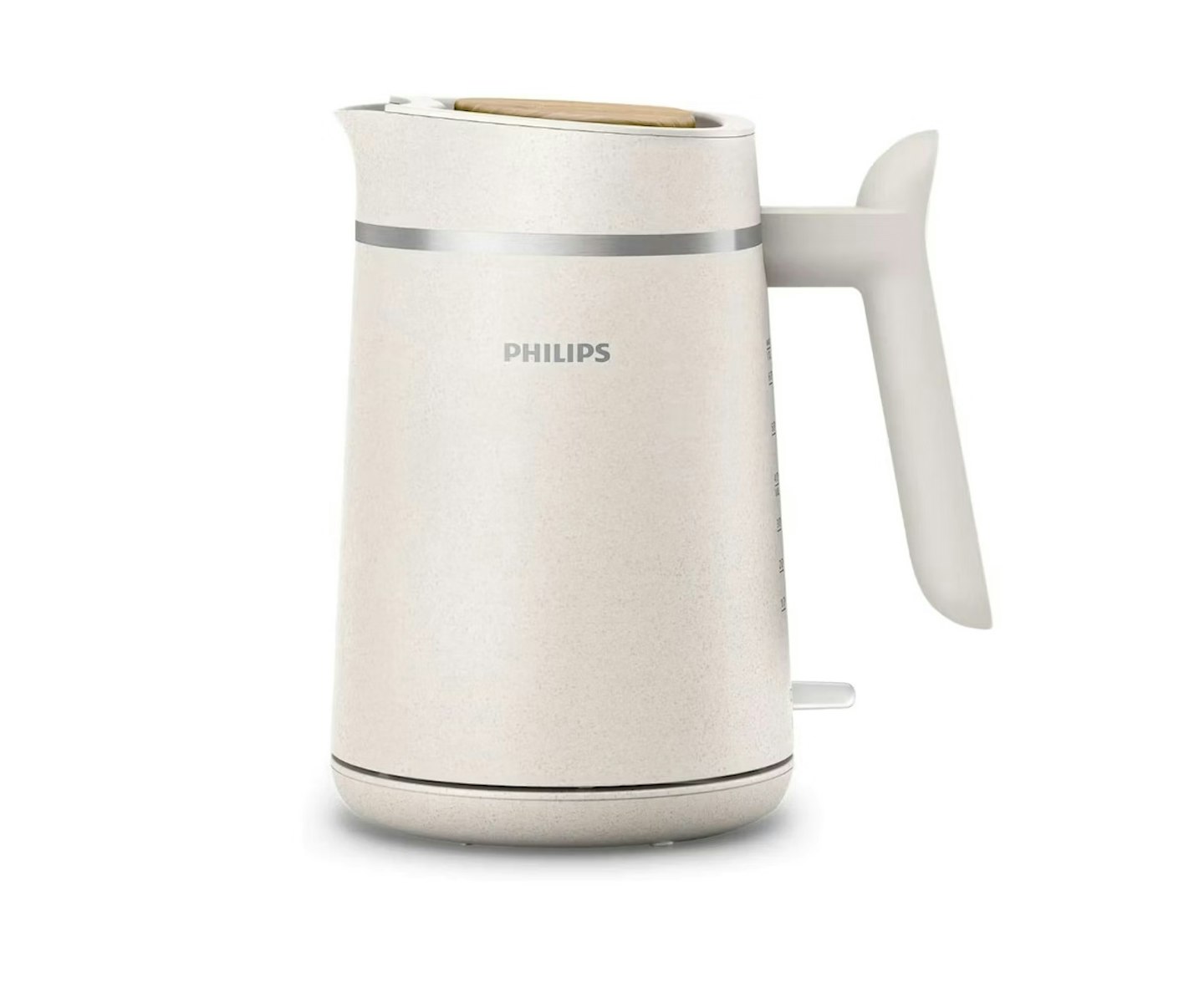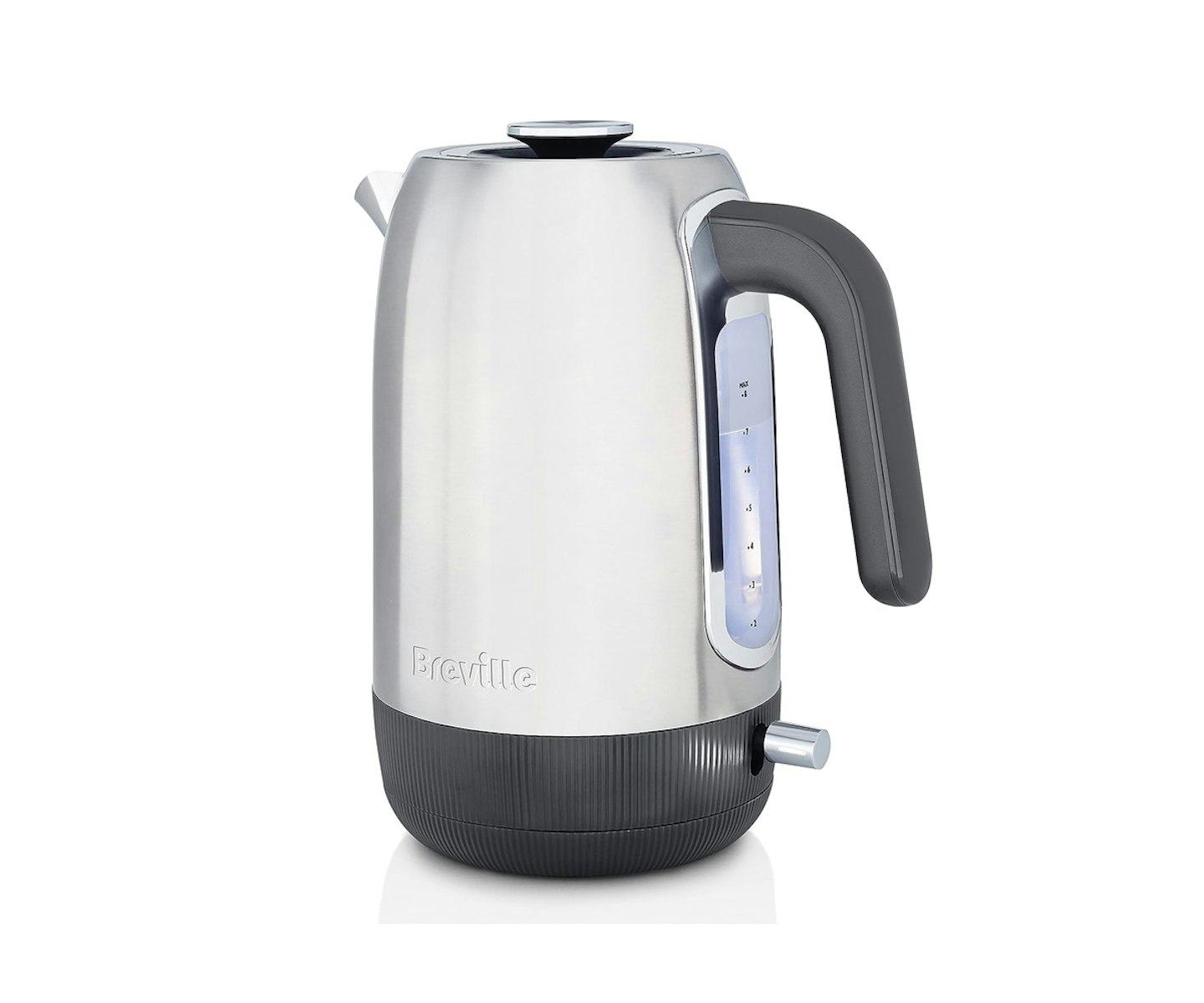If you are on the hunt for the best energy-saving kettle to save you on your bills in the long term, then look no further. Typically, electric kettles are an excellent energy-efficient option - they are substantially more power-savvy than their stove-top counterparts and can also turn themselves off once boiling stops, cutting off any unnecessary power usage. While overfilling remains common, it's best to boil just the required amount of energy. Let's get into our guide for the best kettles for your needs.
Modern smart meters offer a window into our daily consumption, both in terms of water and electricity. These meters allow you to look over your kettle's frequency of use, the energy it requires, and the amount of warm water that goes unused. Particularly in colder months, our kettle's usage tends to go up. Long story short - a faster boiling means less energy consumption over time, and kettles with around 3kW wattage typically boil quickest. You can find many kettles that fit this criteria, from the best quiet kettles to smart kettles.
Best energy-saving kettle at a glance:
• Best quiet boil kettle for efficiency: Russell Hobbs Luna Quiet Boil Kettle - View on Argos
• Best smart kettle for energy saving: Smarter iKettle - View on Amazon UK
• Best eco-friendly kettle: Philips Eco Conscious Edition Kettle 5000 Series -View on Amazon UK
• Best mid-range energy-efficient kettle: Breville Edge Electric Kettle - View on Amazon UK
A study by Science Direct shed light on our national kettle habits. It revealed, "In the UK, more than nine in ten people (90 per cent) use the kettle every day, with 40 per cent doing this five times a day or more." Guilty as charged! Though the report delves deep into the science, it boils down to one main takeaway: smart kettles trump energy efficiency over traditional ones, which goes to show how much energy could be saved nationwide if we switched to more energy-saving appliances.
So without further ado, here are our top energy-saving kettles. From the best stainless steel kettle to compact appliances for your kitchen. Here are our picks of the best kettles to save you on your bills.
Best energy-saving kettle
Best quiet kettle
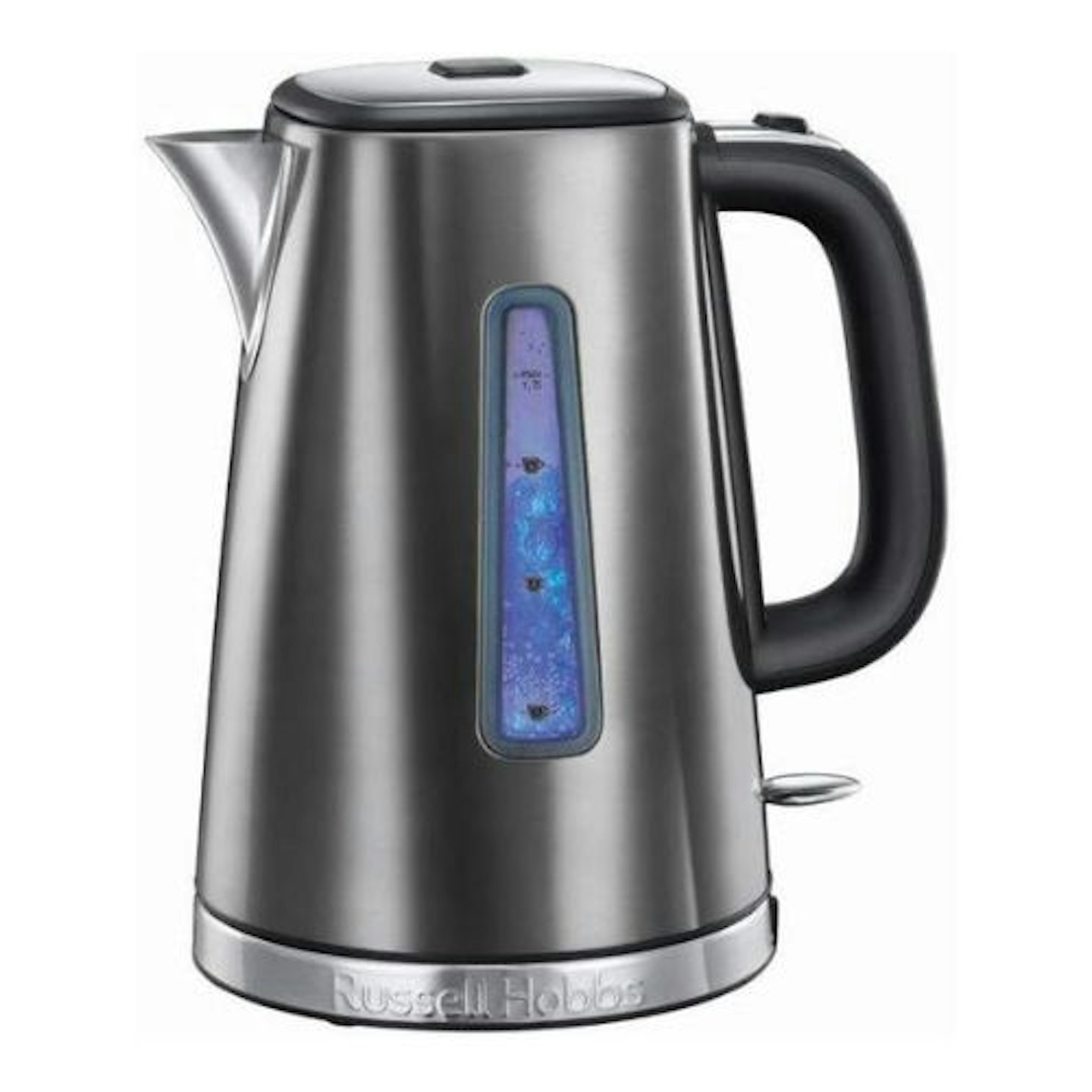
www.argos.co.uk
Sleek and practical, the Russell Hobbs Luna Kettle promises to boil quickly without creating much noise. The efficient 1-3 cup markings allow for energy conservation, reducing consumption by up to 66 per cent when boiling just one cup. Its luminescent water window ensures you never overfill or underfill. Available in red, grey, or copper, it's tailored to align with your kitchen’s aesthetic.
From over 2000 reviews, this Russell Hobbs Quiet Kettle comes with a recommendation rate of 93% - which is super impressive, indeed. Many customers praise its low noise levels, making it ideal for open-plan spaces. Other standout features are said to be the fast boiling to save time and energy, its stylish design (sleek and modern) and good capacity - primed for multiple cups.
As for disadvantages, a few users found it only slightly quieter than standard kettles. And, though many love the quality of this pick, a few customers reported leaks or defects after short use. Just make sure to clean your new appliance before use (!) Overall, this pick is easy to use, well-made and durable, not to mention great for hard water areas.
Pros
- Feels sturdy and has a decent build quality - and stylish (!)
- Limescale filter reduces build-up in hard water areas
- Good capacity - holds water for quite a few cups
- Features a Rapid Boil, which will save you time and money
- Expect low noise levels, making it ideal for open-plan living
Cons
- Basic design - and some reported faults early on
- Some users felt it was not always as quiet as expected
- Users recommend cleaning a few times before use
| Dimensions: | H24.5 x L22.5 x W15.8cm |
| Capacity: | 1.7L |
| Power: | 3kW |
| Filter: | Removable, washable filter |
- Boil dry protection
- Rapid boil technology
- 360-degree swivel base
- Concealed heating and energy saving
Best eco-friendly kettle
The Philips' Eco-Conscious Edition Kettle 5000 Series is made of 100 per cent bio-based plastics and reduces its CO2 production footprint by a commendable 25 per cent. Paired with a strong 2200W power, it promises a swift boil for your hot drinks. Plus, the handy water level gauge promotes judicious water usage, a win-win. What are reviews saying?
Thanks to plenty of reviews, this sustainable pick has an overall rating of 4.4/5 stars. The Philips Eco-Conscious Kettle has plenty of advantages. Many users appreciate the attractive design and lightweight build - making it easy to handle for those with mobility issues and arthritis. Some agree that the boiling process is fast and quick, which means you can have a conversation all the while.
Not only is it safe and ergonomic, it's a good pick for hard water areas, thanks to its metal filter to protect from limescale build-up. As for cons, some users have issues with the lid (requiring both hands to open), build quality concerns and boiling speed variations (slower than expected).
Pros
- Stylish design, lightweight and sustainably made
- Easy to handle - safe and ergonomic design for usability
- Water level and cup indicator are said to be easy to read
- Automatic switch-off function to help save money
- Good for hard water areas - easy to clean lime build-up
Cons
- Some find it slower than expected
- The lid requires both hands to open
| Dimensions: | 24.7 x 23.3 x 20.6cm |
| Capacity: | 1.7L |
| Power: | 2200W |
| Filter: | Anti-limescale filter |
- 360-degree base
- Water level indicator
- Auto shut-off
- Lift-off lid
- Pilot light to see when the kettle is switched on
Best mid-range energy-efficient kettle
Breville’s Edge Kettle is a combination of efficiency and style. Ingeniously designed, its water indicator transitions from white to red upon boiling and remains so until the temperature dips below 80 degrees Celsius. This offers a visible cue for reheating requirements. Crafted from durable brushed stainless steel, this kettle is excellent value.
Sleek and modern in design, this Breville Edge Kettle has earned an overall rating of 4.2/5 stars from reviews on Amazon. It takes approximately three minutes for a full kettle to boil - and even less for smaller amounts. How cool is that? We love that it produces little steam - ideal for use under kitchen cupboards. Not only do customers love the comfy, light and well-balanced build, but also the Still Hot Illumination helps stop any unnecessary reboiling - so, it saves you some money.
As for negatives, some report that the kettle has no LED indicator - they're not sure if the kettle is boiling, besides the boiling sound. Others point out it's a little expensive for a kettle that lacks advanced features. A few customers agree that the level markings are hard to read and that the brushed surface is prone to smudges and fingerprints.
Pros
- Still Hot Illumination Light prevents unnecessary reboiling
- Fast boiling - taking just three minutes at full capacity
- No-fuss, modern design with a brushed stainless steel finish
- Produces minimal steam - ideal for use under cupboards
- Comfortable and well-balanced - ergonomic, lightweight
Cons
- No LED indicator "on" switch
- Small, hard-to-read water level markings
- Surface is prone to prints and smudges
| Dimensions: | H25.8 x W18 x D21.5cm |
| Capacity: | 1.7L |
| Power: | 3000W |
| Filter: | Yes |
- 360-degree rotational base for versatile use.
- Still Hot illumination changes colour from white to red as the water boils.
- Illuminator stays red until the water temperature drops below 80 degrees.
Best temperature control kettle

www.sageappliances.com
This Sage Smart Kettle isn't necessarily smart in the conventional way but refers to the temperature control that brings out the best in green, white, or oolong teas. The kettle features five preset temperatures and a maintain-heat function for 20 uninterrupted minutes. Its user-friendly design showcases a prominent, illuminated start/cancel button and a detachable limescale-catching filter.
Our review: "If you are a really particular tea or coffee drinker this is the kettle to go for. Being metal it naturally keeps water warmer for longer. Sage's Smart Kettle has been developed with Heston Blumenthal with the USP of getting the maximum flavour from tea and coffee by adding water that's the optimum temperature to release tasting notes and aromas. And it's true - coffee does have more flavour when boiled at 90 degrees. Also, green tea tastes delicious, boiled at 80 degrees, allowing the delicate flavour of the leaves and jasmine to shine through.
"It's a smart-looking kettle too, made of brushed stainless steel. Neat and compact, unlike the Zwilling Enfinigy Glass Kettle which has a deeper base. The ergonomic handle stays cool and the soft top lid opens gently to prevent splashing. There are dual water level indicator windows, so you can see the water level if you're using it left or right-handed. It stands steady and securely on its power base, the button controls are easy to use and there's an audible beep when the kettle's boiled. Overall, the product feels very well made. The spout is over large but that has benefits as it gives an even pour. It boils fast, just a tad noisy, but no biggie.
"Finally, I loved the keep warm feature. My freshly boiled water stayed at a constant temperature, while I prepared my cast iron teapot and spooned green tea leaves in. I loved the ritual and thoroughly enjoyed savouring this on a sunny morning by my parent's fish pond with the flag irises in full flower."
Pros
- Effective - does produce better-tasting tea and coffee
- Boils efficiently, compact and super modern feel
- Easy to use with a comfortable handle
- We love how Smart this pick is - with lot of modes
Cons
- Exterior will get hot as it doesn’t have double-wall technology
| Dimensions: | 18.3 x 23 x 25cm |
| Capacity: | 1.7L |
| Power: | 2400W |
| Filter: | Removable filter |
- Auto shut off and boil dry protection
- Five Pre-programmed settings
- Can be used left or right-handed
Best budget kettle
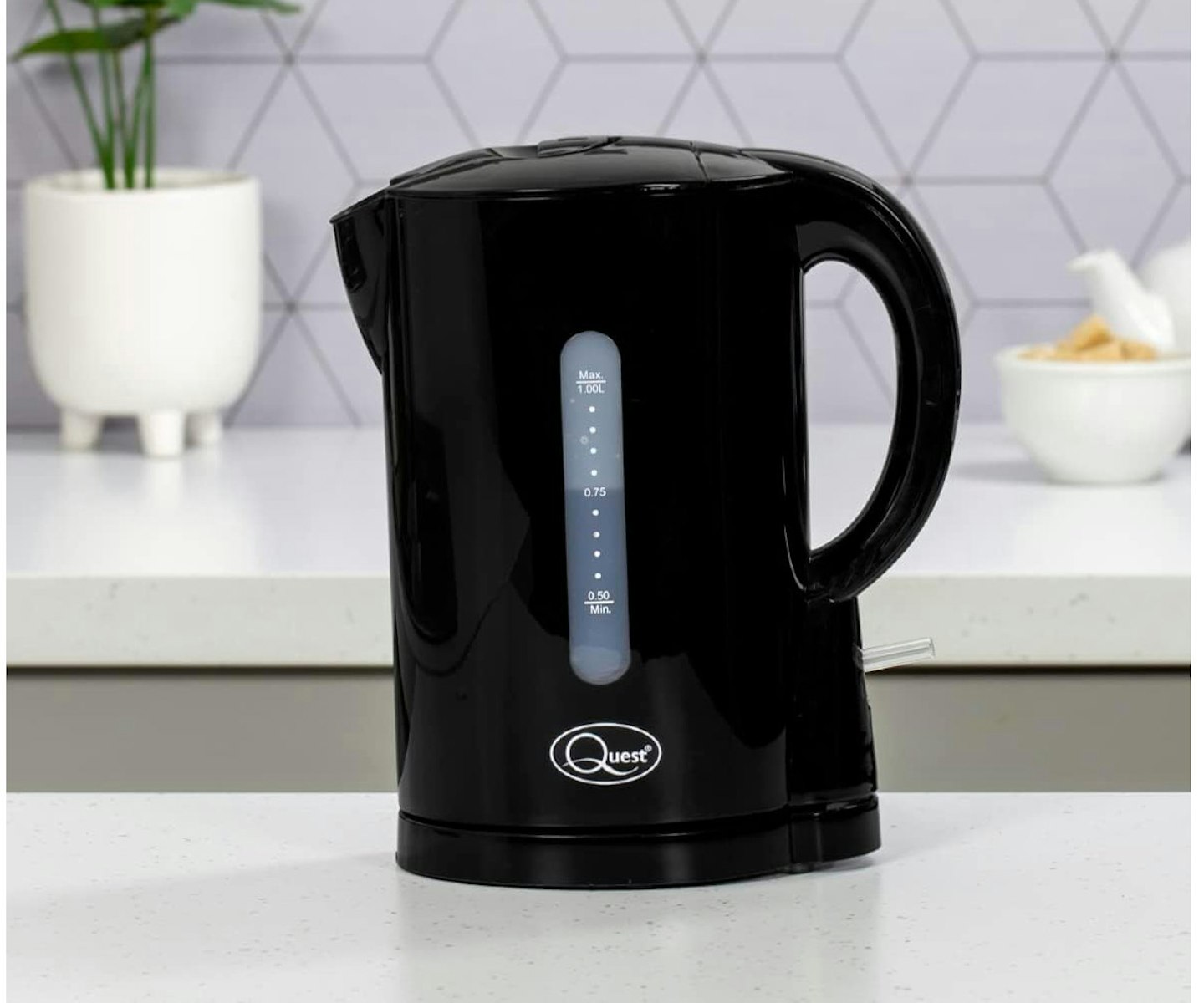
Compact yet efficient, the Quest Kettle is ideal for individual users or smaller households. Despite its lightweight design (790g), it boasts features like a water-level display and a pivoting lid. It's particularly senior-friendly too. Energy savers will appreciate its low wattage, though a bit more patience is needed for boiling.
With a respectable 4.2/5 star rating, this Quest 35039 Kettle is our budget pick. Compact and space-saving, this kettle is ideal for small kitchens, caravans, motorhomes, students, and travel use. Not only is it perfect for those with limited power capacity, but customers agree that's lightweight and arthritis-friendly. We love the simple and functional design - with a handy water level indicator, power light and filter for hard water areas. It's good quality, affordable and great for trips and small households.
As for negatives, some customers are unhappy with how long it takes to boil and found the capacity smaller than anticipated, though it still holds about three mugs of water. And, the base is not 360° - so the kettle must be placed down at a specific angle which can be fiddly and not so great for left-handed folks.
Pros
- Low wattage saves on energy consumption
- Perfect for one or two people - small households
- Compact, space-saving and lightweight for easy use
- Simple yet functional design - plenty for convenience
Cons
- Smaller than expected - holds three mugs
- Can take a little while to boil compared to others
- Lack of 360° base excludes left handed users
| Dimensions: | 14 x 20 x 23cm |
| Capacity: | 1L |
| Power: | 1080W |
| Filter: | Removable filter |
- BPA free plastic
- Auto shut-off
- Water level indicator
Best vacuum-insulated kettle
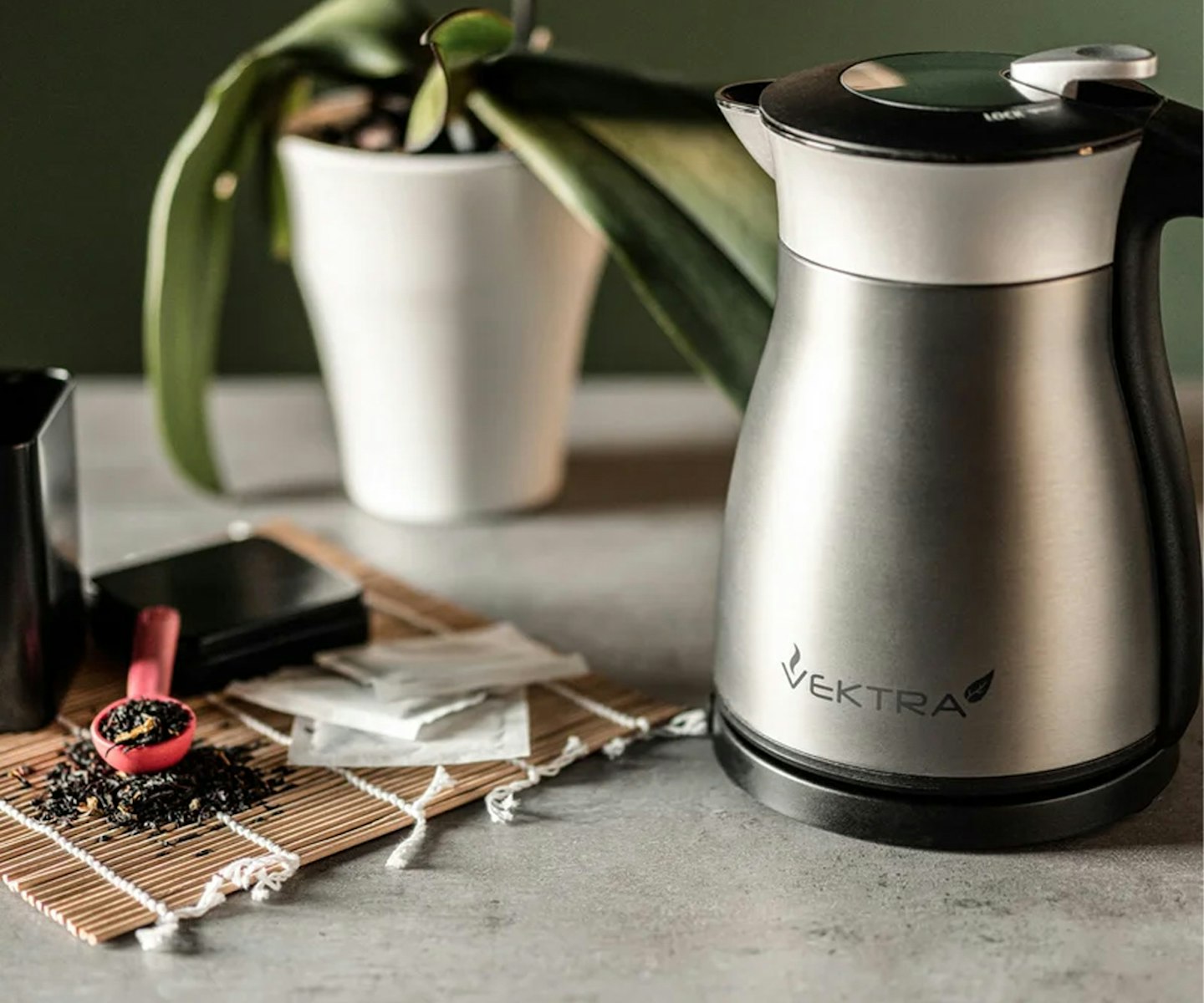
www.wayfair.co.uk
Merging the perks of a double-walled vacuum flask with an eco-friendly kettle, this Vektra model is an excellent pick. It keeps water piping hot for up to four hours. Crafted from premium 18/8 stainless steel, this robust Vektra Vacuum Insulated Electric Kettle promises longevity, plus its design saves reboiling hassles. From its energy-saving design to its durable, stylish build, the Vektra Kettle is well-constructed, sleek, risk-free, and modern. And, it will save you a little electricity and money (!)
With a gleaming 4.4/5 star rating, the Verktra model helps save you money, thanks to its many features - including its ability to keep water hot for hours. Your bill will thank you (!) Not only that, but customers vouch for its sturdy, well-designed build and love how it heats quickly, with minimal noise. It's a pick suited to open-plan living. Many reviews appreciate the eco-friendly design. Negatives seem to surround how heavy it can be to carry, how slow the pour is from the controlled spout and the lid can be a little tricky. Plus, the button release requires a firm press, which may be challenging for some.
Overall, a sleek and modern pick that will save on bills and the environment.
Pros
- Can keep water hot for hours without re-boiling - good for bills (!)
- Said to have an excellent build quality - it's sturdy and durable
- Super efficient use - will heat quickly, with minimal noise
- Available in different colours and sizes for any household
Cons
- Said to be a little heavy to lift and requires a firm press
- Lid design could be improved - not smooth for some users
- Though safe and controlled, the pour can be too slow
| Dimensions: | H24.5 x W23 x D20cm |
| Capacity: | 1.2L |
| Power: | Not specified |
| Filter: | Integrated limescale filter |
- Stays hot for up to four hours
- Automatic shut-off
- Cool touch body
- 360-degree rotating base for ambidextrous use
- Illuminating on/ off switch
- Strix heating element
- Quiet boiling
Best energy-saving kettle under £30
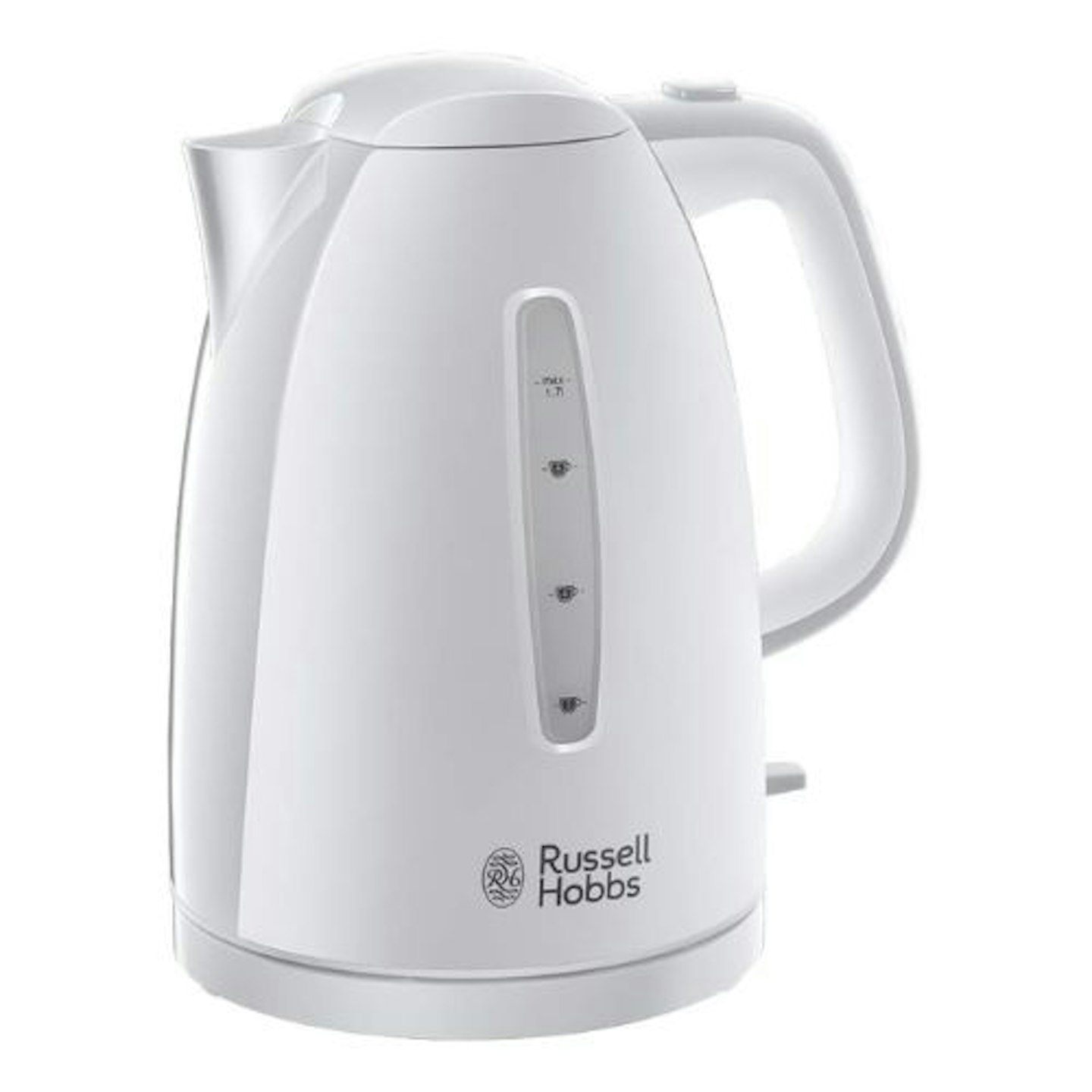 Amazon
AmazonWhile the Russell Hobbs Textures kettle might not win design awards, it's undeniably efficient. With a spacious 1.7L volume and an impressive 45-second per cup boiling rate, it swiftly serves your caffeine needs. Energy-efficient, it boasts up to a 70 per cent reduction in energy consumption. Besides, it's budget-friendly and comes with a three-year guarantee too.
From plenty of reviews on Amazon, this Russell Hobbs pick has earned a respectable 4.4/5 star average, thanks to its affordability and reliable performance. Yes - it has been praised for its quick boil, and ease of use - with a simple push-button lid - not to mention, good pouring action and lightweight build. Those with mobility issues will have no problem carrying this from stand to cup. Plus, it's available in three colourways for your preference.
Though users mention that it takes a few seconds to switch off after boiling, there is no light-up water level indicator for an easy read and that the spout could be better, it's a budget-conscious and simple buy - with no frills.
Pros
- Style on a budget - modern feel for a little price
- Rapid Boil can deliver a cup in under a minute
- Capacity helps make six cups - ideal for households
- Pour spout promises to keep your kitchen mess-free
Cons
- It can take a few seconds to switch off after boiling
- No light-up water level window - hard to read (!)
- Spout could be better - some users report dripping
| Dimensions: | H23.8 x W15.8 x D21cm |
| Capacity: | 1.7L |
| Power: | 3000W |
| Filter: | Removable and washable limescale filter |
- Boils one cup in 45 seconds
- 2 years manufacturer guarantee
- 360-degree base with cord storage
What to consider when buying a kettle
Kettles have long been kitchen mainstays for more than just brewing tea. From your morning coffee to instant meals like pasta, they play a surprisingly versatile role in our daily culinary routines. But what should you keep in mind when selecting one?
Energy-saving: If being eco-friendly is a top priority, an electric kettle is your best bet. They typically operate between 2-3kW. Remember, higher wattage translates to quicker boiling times. Little fact - the first automatic stainless steel kettle was by Russell Hobbs in 1955, using steam to trigger an auto shut-off, ensuring efficiency and safety.
Limescale filter: Especially useful for those in hard water regions, choose a kettle specifically designed to combat limescale build-up to ensure you have purer water.
Water level indicator: A clear indicator helps you fill just the right amount of water, avoiding energy waste from boiling more than needed.
Advanced features: If you're willing to invest a bit more, modern smart kettles come packed with features like silent boiling, precise temperature settings, prolonged 'keep warm' settings, voice commands, and even app compatibility.
FAQs: Best energy-saving kettle
How do I measure the energy consumption of my kettle?
One way to see how much energy your kettle is using is to do an experiment with your smart metre's in-home display (IHD). An IHD shows you how much energy you're using in kilowatt hours (kWh) and it shows how much it costs. Citizens Advice suggests turning off all devices, except essential electricals, then using your kettle to see how much it costs you.
If you don't have an in-home display or smart meter, you can work out how much your kettle costs to use with this equation:
Appliance Power (W) x Amount of Time Used (p/h) x GBP per kWh (0.33) / 100 = Price Per Use
As of April 2023 the unit rate for electricity is on average 33.21p/kWh.
Amount of Time must be in decimals (0.5 is 30mins, 1.5 is 90mins)
For example, if you've totted up that you use your 3000W kettle for 15 minutes a day the sum is:
3000 x 0.25 x 0.33 / 100
Rounded up, it works out at 2.5 pence a day to use a kettle.
Are smart kettles energy-efficient?
Many smart kettles come with energy-saving features such as precise temperature control, which means you only use as much energy as needed for your desired temperature. However, always check the product specifications and reviews to ensure energy efficiency.
Ellen Kinsey was a Senior Health and Wellness Product Writer and has been a part of Bauer Media since 2020. She has left Bauer Media to study Ayurveda in India to expand her knowledge and skills in the health and wellness field, where she plans to continue making journalistic contributions.

